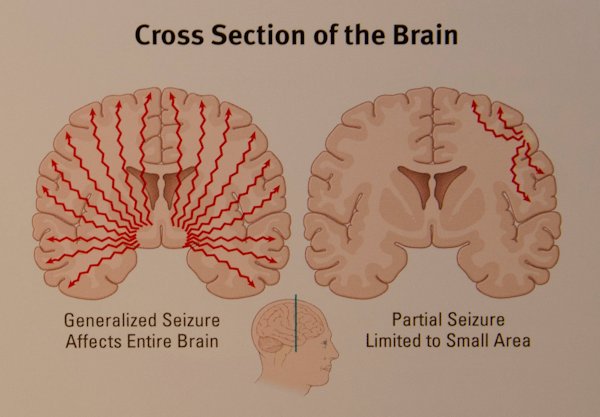
What Are Seizures and Epilepsy?
Epilepsy is a medical condition where a person has recurring unprovoked seizures. Having a single seizure does not mean that a person has epilepsy. Many people have a single isolated seizure and don’t go on to develop epilepsy. Seizures are short episodes when a person does not function normally because of abnormal electrical discharges in the brain. Nerve cells communicate with each other through electrical impulses. During a seizure, these impulses become overactive or occur at the same time, which leads to irregular brain activity. This can cause changes in behavior and body functioning. Epilepsy affects nearly 3 million people of all ages in the United States.
What Causes Epilepsy?
Epilepsy does not have a single cause. In fact, for many people with epilepsy, no cause is ever found. Some known causes include:
- Developmental abnormalities in the brain
- Infections that injure the brain
- Lack of oxygen to the brain
- Disturbance in blood circulation to the brain (stroke and other vascular problems)
- Tumors of the brain
- Previous trauma (such as brain injury)
- Genetic Causes
What Are the Symptoms?
The most visible sign of epilepsy is a seizure. Seizures usually last from seconds to several minutes. There are many types of seizures. Some are severe. Some are subtle. People having a seizure might not be able to respond to others. They may not remember the seizure. Sometimes a seizure will be widespread, causing symptoms throughout the body.
Some of the symptoms and behaviors that can occur during a seizure include:
- Convulsions (uncontrollable muscle stiffening and shaking)
- Brief staring spells
- Repetitive, automatic behavior, such as chewing movements
- Decreased awareness of what is going on
How Is Epilepsy Diagnosed?
Your neurologist will ask you and your family members or other observers about any seizure-like episodes you may have experienced. Your neurologist will need to understand your family’s medical history to see whether you have an inherited form of epilepsy. Your neurologist will also determine whether you have other risk factors for epilepsy and perform a neurologic examination. It is likely that your neurologist will perform several tests, including:
- Electroencephalography (EEG), which records brain wave patterns
- Magnetic resonance imaging (MRI) of the brain
- Blood tests
What Are the Treatment Options?
The most common treatment to prevent seizures is the daily use of medications. Nearly 70% of people with epilepsy can have good control of their seizures using medications. Most people whose seizures are controlled with drugs have few restrictions on their activities.
Many medications are available. Some of them work better for one type of epilepsy than another. Talk to your neurologist about the choice of medication, how often it is taken, and any side effects. Side effects may vary from one drug to another and from one person to another. Your neurologist will make sure that the prescribed drug is the best medication for you.
In some cases medication does not work. Then surgery or vagus nerve stimulation may be an option. In vagus nerve stimulation, a device similar to a pacemaker is implanted under the skin on the chest. It reduces seizures by delivering electrical signals to the brain via the vagus nerve in the neck. Epilepsy surgery usually involves identifying and removing the seizure focus. It can be very effective and even curative for some people, even when medications have failed. It is not a “last resort.” Talk with your neurologist about the best treatment for your seizures.
Living with Epilepsy
Epilepsy is different for everyone. Some people have seizures that are easily controlled; their epilepsy doesn’t have much effect on their daily lives. Others may find that their seizures will have a bigger impact on their lives; they may affect the way they work, socialize, or complete daily activities.
Controlling Seizures
To help control your seizures:
- Take your medication as prescribed
- Maintain regular sleep patterns
- Avoid excessive alcohol use or use of illegal drugs
- Work to reduce and manage stress
- Talk to your neurologist about any changes in symptoms or new symptoms
- Exercise to maintain your overall health
Driving and Safety
In many states, laws require people to report any medical condition that may affect their ability to maintain control of a vehicle. In some states, physicians must report people with such conditions. Sometimes, a physician’s approval is needed to be able to drive again. Talk to your neurologist about this issue and your overall safety.
Women and Epilepsy
Women with epilepsy should talk to their neurologist before becoming pregnant. Most pregnancies in women with epilepsy have a happy outcome and a healthy baby. But both seizures and the drugs that treat seizures can be harmful to the developing baby. Women need to be under close medical care to make sure the epilepsy is under the best control possible.
Resource: American Academy of Neurology
